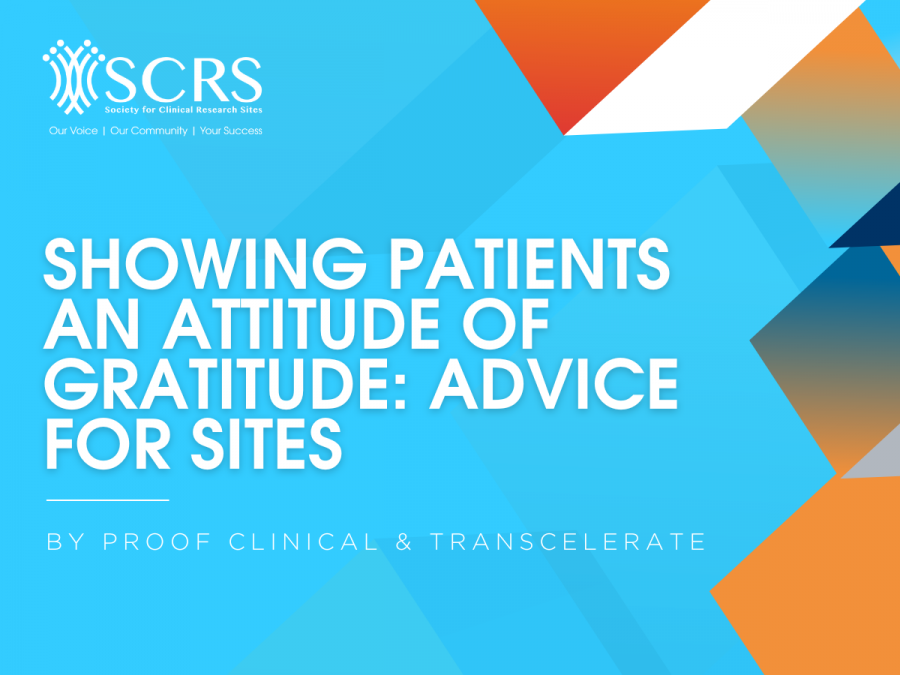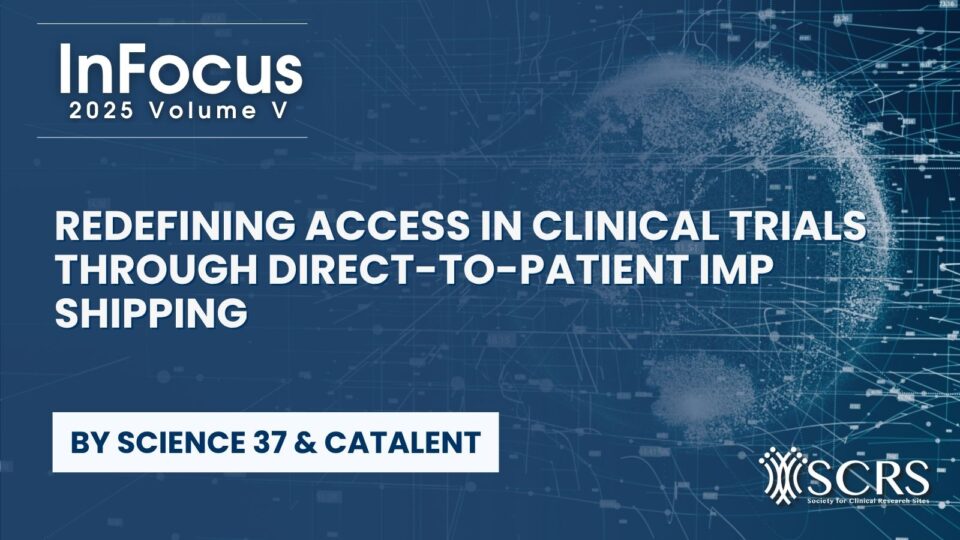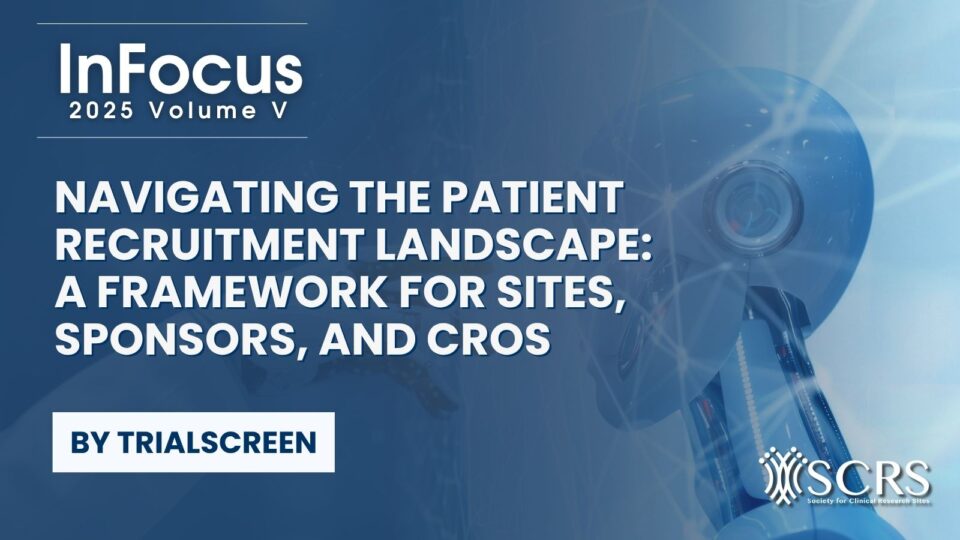Showing Patients an Attitude of Gratitude: Advice for Sites

Modern medicine owes a lot to clinical trial participants. Patients give their time, energy, and often literal blood and other specimens to help find cures for today’s diseases and help speed drug development.
Yet, offering a “thank you” to patients is an inconsistent practice at best. Thirty-three percent of clinical trial participants report low satisfaction with their clinical trial journey, according to a 2022 survey conducted by TransCelerate BioPharma and the Center for Information and Study on Clinical Research Participation (CISCRP). In a climate where finding and enrolling patients as well as retaining them throughout a trial are common barriers to a successful trial, the simple act of showing gratitude to patients can make a positive difference.
Sponsors should design patient-friendly trials and equip sites with the tools to interact with patients in a meaningful way. To help address this, TransCelerate BioPharma recently released a Gratitude Toolkit to help stakeholders show appreciation to clinical trial participants and their care partners in ways that resonate.
Potential Benefits
The benefits of implementing gratitude into a clinical trial are multi-fold. It can:
- Improve recruitment (via word of mouth) and retention
- Improve a participant’s confidence in their clinical trial experience
- Improve relationships between site staff and the participants
- Demonstrate recognition of the challenges participants may be facing and may help support them in their clinical trial
- Improve the reputation of clinical research
- Improve a participant’s satisfaction and perceived value in their clinical trial journey
- Improve engagement, adherence, and compliance
- Help create a sense of community and a culture of gratitude
How Sites Can Have an “Attitude of Gratitude”
At the regional and site level, there are a few ways to demonstrate gratitude. For example, consider the cultural implications and appropriateness of different tactics and/or tools planned for the trial. Similarly, understand how local regulations and privacy laws may impact the implementation and roll-out of planned gratitude activities. Sponsors can consider how the planned tactics and tools will impact the sites. Is storage required? What does logistics entail and was training provided?
At the study level, be mindful of the patient population and consider what is meaningful or what would help them feel appreciated. This can be done through insights research or obtaining patient feedback. Personalize the experience for the participants and their care partners. Post-trial, evaluate the benefit and impact of the gratitude program to make any necessary changes to ensure value.
Some materials that can be in a site’s gratitude toolkit include:
Thank You Cards or Letters
A greeting card can be mailed from the study team to thank the participant for their participation, no matter the level. A card template with customizable text provides a personal way to show appreciation and gives the study teams the ability to adjust language in the thank you cards for increased personalization.
These activities should not be applied solely to the participants that are currently in a trial. For some studies, 30 to 70 percent of participants of clinical trial volunteers may “screen fail.” While they may not be a fit for that particular trial, sending them a thank you card at this point in time could greatly impact their interest in future research. Inside the card, consider providing them with the rationale as to why the study is not appropriate for them; encouragement to look into other trials in the future; information on how to find other trials; an opt-in for those participants who do not enroll to be contacted for future studies. These “Do Not Enroll” versions of the card can be printed in bulk to make it easier for sites to mail to patients and their caregivers.
Milestone Certificate
A milestone certificate can be given to study participants at relevant study milestones to remind them of their progress in the study. They can be given at the beginning, middle, and end or sites can adjust the cadence in relation to the length of the study.
Consider the distribution of these certificates as an opportunity for a personal discussion with the participant and their care provider on progress. While some may view a milestone certificate as “cheesy,” it prompts the site to take a moment to acknowledge the participant. The sites can have the flexibility to determine if it will resonate with a patient or not.
Note that when using a milestone certificate, it is important to be mindful of the indication. For indications where there are limited other treatment options or participants have likely exhausted all available treatment options, study milestones may not be viewed as celebratory.
Condolence Cards
When a patient dies while participating in a clinical trial, it is distressing and painful for the patient’s family as well as the site staff that has cared for the patient. Expressing condolence to a trial participant’s family is a gesture that may not be usually done on the part of the site staff due to possible uncertainty about what is to be communicated.
A personal, handwritten card can provide solace to a family in a difficult time. Express sympathy, use the patient’s name, and share that the patient made a difference by participating in the trial and that the study team is grateful. If a care partner was involved in trial visits or helping the patient while they attended trial visits, acknowledge their time.
Additionally, the trial outcome may be particularly important to some families. Consider an insert which includes the trial name and number. Offer the family an estimated date of when they can expect these results (approximately 1 year after the trial’s last patient last visit (LPLV) is completed for adult trials; about 6 months after LPLV for pediatric trials).
Flexibility
A patient-centric trial should accommodate for the individual and cultural preferences of patients. The best way to determine what tools and tactics are most relevant to a specific country/region and ensure inclusivity is by testing them with the target patient population prior to study start. Some tactics and tools may require adjustment in terms of timing, content, or may not even apply. For example, in some countries, “thank you letters” from a site are not seen as appropriate. In those countries, a “thank you card” may make more sense from a cultural perspective.
While TransCelerate’s toolkit includes materials for the entire process, sites need the flexibility to choose what works from them. Each trial is not a linear journey and the activities and emotions felt along the journey may differ from participant to participant.

Ultimately, the relationship and the sincere appreciation that participants want to see and feel is between the site staff and the participant. TransCelerate’s Gratitude Toolkit is a toolkit that sponsors (in partnership with sites) can leverage to acknowledge and show appreciation to clinical trial participants and their care partners. Often, the sponsor will create the materials and provide them to the site for use with the patient. When using the Gratitude Toolkit, TransCelerate recommends sponsors consider flexibility and collaboration with sites to allow sites to do what is best for their participants.
When in doubt, consider the impact of a simple verbal thank you. Today’s medicine would not be possible without clinical trial participants.
By Proof Clinical & TransCelerate



